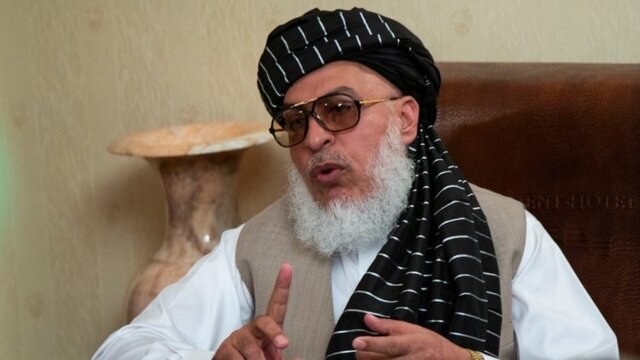Taliban official says committed to honoring Iran water rights

TEHRAN- Sher Mohammad Abbas Stanikzai, the political deputy minister of the caretaker government of Afghanistan (Taliban), has emphasized that the Islamic Emirate is committed to ensuring Iran’s water rights according to the 1973 treaty.
The political deputy of the Taliban's foreign minister told Tolou News on Sunday that currently, there has been enough water to meet the needs of Afghan citizens, not an amount that would be diverted towards Iran.
He also stated that it is clear that the ratio of drought to rainfall is higher, and most of the time, there is no rain or snow. Even if there is water, it is not enough to be diverted to Iran, and this amount is not enough to address Afghanistan’s own problems.
The Taliban official emphasized that in case of an increase in water from the Helmand River and the resolution of challenges faced by Afghan citizens in this regard, they will ensure Iran’s water rights.
In response to criticisms by some Iranian officials about water shares, he said that the caretaker government of Afghanistan never wants to jeopardize its relations with Iran due to water.
“Sometimes they have harsh words, but we do not respond to these harsh statements. We only say that when there is additional water, we will give our Iranian brothers their water rights,” he added.
These statements from the Taliban official come as previously Hassan Kazemi Qomi, the special representative of the president for Afghanistan affairs, expressed hope in an interview with ISNA that in the current water year, we will see water entering the country from Helmand.
He also continued by saying that Taliban officials have stated from the beginning that they are committed to the 1351 treaty. Last year, due to negligence, a significant portion of floods inundated an area related to the Kamal Khan Dam. According to experts, Kamal Khan Dam is a diversion dam with limited capacity, constructed in a way that most of the water it receives is floodwater and it does not have the necessary capacity for this volume of floods and is released towards the salty region. Additionally, the dam's outlet gates are positioned at a higher elevation facing land.
Qomi stated that in the past year, Taliban officials told us that they have addressed the issues with the dam. Firstly, they controlled the wall where water flows and overflows from behind the dam. Secondly, they repaired the main gates of the dam and flattened the land in front of these gates.
He also averred that it was agreed at the Helmand River Water Commissioner meeting that Iranian technical authorities would verify these issues, and we expressed readiness to assist in any necessary improvements.
Iran's ambassador to Afghanistan, in response to whether Iran's water rights will be fulfilled in the current water year, stated, “The 1973 treaty does not say that if water comes, water rights will be given; rather, it states that Iran's water rights should be provided from the amount of water in Kajaki Dam. It has not been explicitly stated that if it rains, Iran's water rights will be granted.”
Last year, first Vice President Mohammad Mokhber said that Iran is “determined” to resolve the dispute with Afghanistan over water sharing.
Mokhber confirmed that negotiations were underway between Iran and Afghanistan to secure Iran’s water right from the Helmand River.
Based on the 1973 treaty, Afghanistan is legally obligated to allocate 820 million cubic meters of water from the Helmand River to Iran.
However, Afghanistan has built dams on the 1150-kilometer-long river and changed its course. The move has led the Hamoun wetland in the border province of Sistan-Baluchestan in southeastern Iran to greatly dry up.
The locals’ livelihood is greatly dependent on the wetland which has been fed by the Helmand River for millions of years. The water from the river is used for drinking and agriculture. It is also a source of income for fishermen.
Also, the deputy vice president for legal affairs said that the 1973 treaty is a comprehensive one which has delineated the water rights of Iran and Afghanistan.
“For resolving the Helmand water problem there is a comprehensive treaty and we want the Afghan officials to honor their commitments based on the treaty,” Mohammad Dehqan said.
Dehqan added it is “expected that the issue is resolved” through expert meeting in accordance with the 1973 treaty otherwise it will be resolved through “arbitration”.
During a visit to the border province of Sistan-Baluchistan on May 18 (2023), President Ebrahim Raisi warned the "rulers of Afghanistan" should take the issue of Iran's “water rights seriously."
The warning followed a phone conversation between Amir Khan Muttaqi, the acting foreign minister of the Taliban administration, and Iranian Foreign Minister Hossein Amir Abdollahian over several issues, including Iran’s share of water from the Helmand River.
Amir Abdollahian requested the Taliban open the gates of the Kajaki Dam "so both the people of Afghanistan and Iran can be hydrated."
Taliban officials recently claimed that due to low water levels, even if they opened the dam, nothing would reach Iran.
But Amir Abdollahian said that can only be determined by a joint technical team in accordance to the 1973 treaty. Iran has proposed such a team inspect the Kajaki Dam to assess the situation, the minister said.
Raisi said that if the experts confirm the water shortage, Iran would drop its concerns.
The Iranian Energy Ministry has announced satellite images show claims by Taliban officials that there is not enough water behind dams is not true.
Leave a Comment